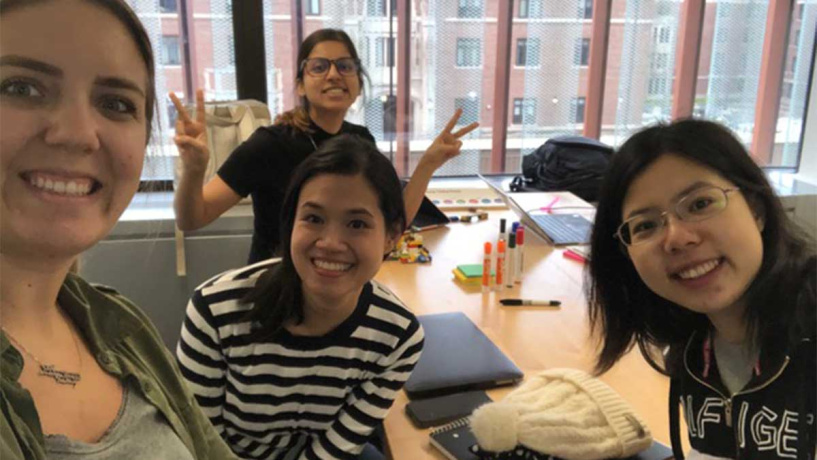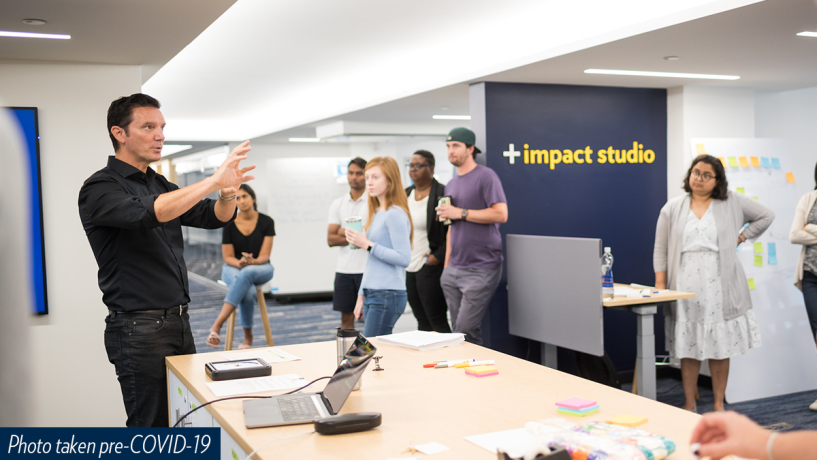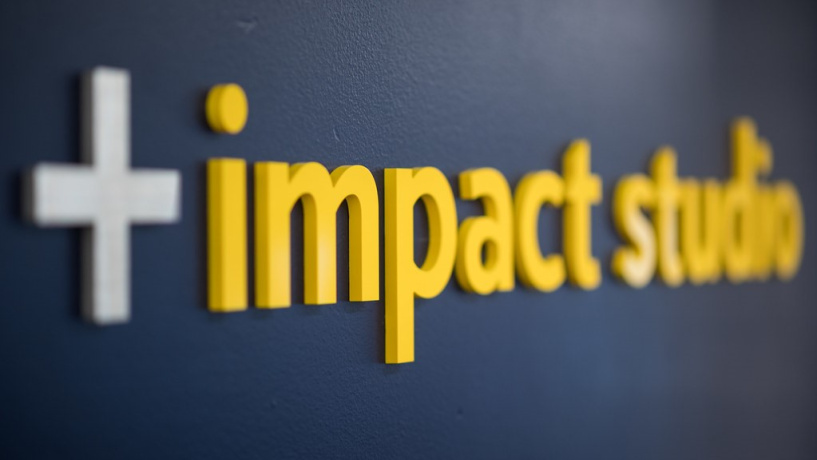Advancing My Social Impact and Racial Equity Work Through the +Impact Studio
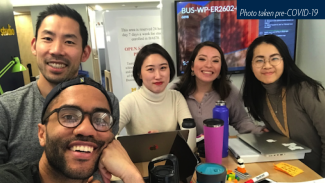
I am a Returned Peace Corps Volunteer who is pursuing a dual degree in business and social work, so the +Impact Studio was at the intersection of both my professional and personal goals.
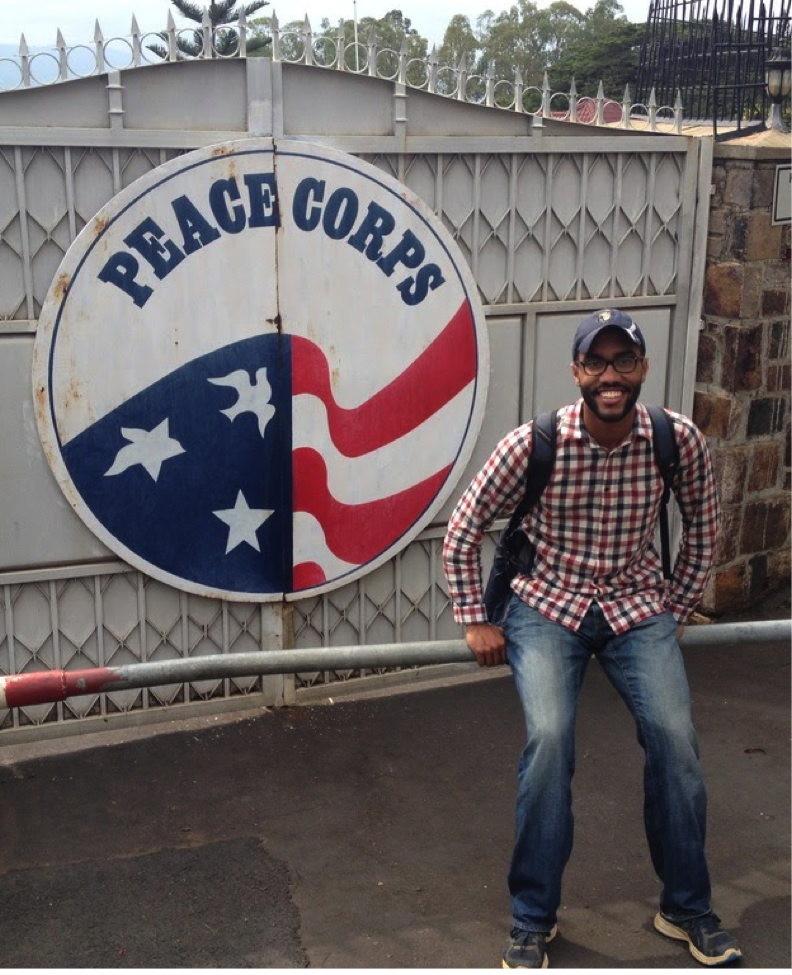 When I completed the +Impact Studio course at the Ross School of Business, I left with a sound understanding of design thinking and experience doing interdisciplinary, action-based learning, all the while having a social impact as our North Star. After taking the course, I knew I wanted to stay connected with Michigan Ross Professor Jeffrey Sanchez-Burks and the burgeoning +Impact Studio being cultivated at Ross.
When I completed the +Impact Studio course at the Ross School of Business, I left with a sound understanding of design thinking and experience doing interdisciplinary, action-based learning, all the while having a social impact as our North Star. After taking the course, I knew I wanted to stay connected with Michigan Ross Professor Jeffrey Sanchez-Burks and the burgeoning +Impact Studio being cultivated at Ross.
As I enter my last year in my dual-degree program, I’d like to share my experience working in the +Impact Studio, which is part of the Business+Impact initiative at Michigan Ross, and how it reflects my professional experience prior to Ross and is accelerating my post-graduate goals as a social entrepreneur.
Bringing my passion for social impact to Michigan Ross
I applied to the dual MBA/MSW program at Michigan Ross with the long-term goal of starting a financially sustainable social venture. If there was one concept that stuck after my three years serving in the Peace Corps in Rwanda, it was the idea of sustainability. After decades of investment in international development and dashed outcomes, a sea change had taken place within the industry. The idea was boiled down to the oft-repeated sentence: “If your project isn’t sustainable, it’ll die the day you leave.” After hearing the need for sustainability over and over, and being able to witness firsthand the projects that withered shortly after a funding source or international volunteer left, I became a disciple of sustainability. The +Impact Studio captures this ethos in its premise of using business concepts and design thinking to create sustainable solutions to some of the world’s most pressing problems.
Being a Black male graduate student, one of the most pressing social challenges I face is the impact of global anti-Blackness. From my experience in the nonprofit world tackling HIV health disparities by addressing the underlying systemic racism, I was well aware of the emotions that emerge when dealing with the topic of race. I realized a solution to the problem of navigating the emotional discomfort of engaging on the topic of race would be to develop a social-emotional learning curriculum for racial justice. I reached out to Professor Sanchez-Burks at the end of my semester in the +Impact Studio course to discuss how I could continue to utilize the +Impact Studio as I developed my passion project. It just so happened my request coincided with an expansion of Business+Impact’s portfolio of programs and activities in the studio.
From a student in the +Impact Studio course to Impact Design Founder and Fellow
Over the summer of 2020, Business+Impact rolled out the Impact Design Fellows and Impact Design Founders programs. I initially joined as an Impact Design Founder, wherein I would receive support from the Impact Design Lab — a social venture accelerator — to support my racial justice, social-emotional learning venture, EQuity. The Design Lab was a space where founders could receive coaching and guidance from the studio’s Innovator-in-Residence, get advice from fellow founders, and attend workshops on topics spanning from defining your value proposition to sizing your market.
The racialized violence of the spring and summer of 2020 marked by the murders of Breonna Taylor, Ahmaud Arbery, and George Floyd created a second opportunity for me to deepen my relationship with the +Impact Studio. The studio’s Impact Design Fellows were an expansion of the studio that sought to take social impact solutions developed in the BA 670 course and bring them to market. When I was a student in the course, my team’s proposed solution to addressing the challenge of college affordability was a project called the Opportunity Equity Pledge. The premise of the pledge was, if you are attending graduate school at the University of Michigan, you have likely witnessed the inequitable currency of social capital. As such, it is our inherent responsibility as U-M graduate students to use our access and privilege to undo many of the systemic inequities and barriers to college and careers that marginalized communities face. Given the role race often plays in marginalization in the U.S., we iterated on the project and spent the summer and fall semesters developing and prototyping the Racial Equity Pledge. As an Impact Design Fellow, I was able to lend my professional and educational background in racial and social justice to the project.
Using +Impact Studio insights to advance my racial equity startup
As I look back on my many touchpoints with the +Impact Studio, I see an intertwined story of growth both for myself and the studio. Reflecting on my time in the course, I think of how concepts like bricolage (creation through the combination of multiple things) and effective brainstorming activities have fueled creativity and innovation for my startup. My time as an Impact Design Fellow allowed me to implement elements of design thinking to support developing our project through end-user interviews and sharing rough prototypes — which research shows produces the most honest and helpful feedback. Lastly, as an Impact Founder, I have taken a bias to action as an entrepreneur that has carried me and my venture to the finals of the Michigan Business Challenge and a minimum viable product that we will take to market this summer.
My life in the classroom of the real world revealed many valuable lessons about the systemic barriers that preserve inequality and the tools necessary to forge sustainable progress. The +Impact Studio has been the place where I have taken my lessons from life, coupled that knowledge with the insights of applied research, and forged ahead on my mission to advance social impact.





